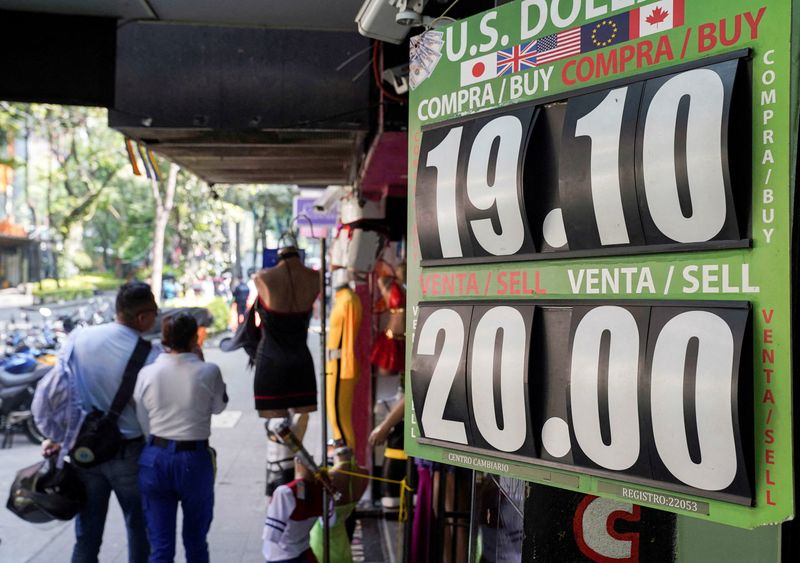By Laura Matthews and Saqib Iqbal Ahmed
NEW YORK (Reuters) - Multinational companies are beefing up their foreign exchange hedging strategies to guard their overseas earnings from larger currency swings that could come from a second Donald Trump presidency.
Since the U.S. election three weeks ago, strategists and bankers said they are seeing more interest in options and cross-currency swaps as companies, including those in healthcare and industrial sectors, focus on how volatile currencies may be under Trump.
"The election is a big catalyst for hedgers to think about currency risk," said Karl Schamotta, chief market strategist at payments company Corpay in Toronto.
"Businesses that for a long time were relatively comfortable with the direction and the scale of exchange-rate moves are being shocked out of that complacency."
Trump's election is introducing volatility into foreign-exchange markets as his victory clears the way for tariffs and protectionist trade policies that were the hallmark of his first term.
Trump said on Monday he would impose a 25% tariff on all products from Mexico and Canada, and an additional 10% tariff on Chinese goods, on his first day in office, citing concerns over illegal immigration and illicit drugs.
The news prompted the peso to drop as much as 2% while the Canadian dollar fell as much as 1.4%.
The U.S. dollar index, which measures the U.S. currency's strength against six peers, has risen 3.5% since the Nov. 5 election, broadly on expectations Trump's policies on trade and tariffs will be dollar-supportive. Scott Bessent, Trump's U.S. Treasury secretary pick, has favored a strong dollar and supported tariffs.
Adding to the uncertainty is the 2026 review of the United States-Mexico-Canada trade agreement that outlined tariff provisions and was implemented during Trump's first term. Trump has said he intends to make the agreement "a much better deal," although details of changes are unclear.
Trump's first term, which was marked by big swings in trade-sensitive currencies, highlighted the need for more hedging, analysts said.
At the same time, global central banks are trying to normalize interest-rate policy while balancing growth and inflation concerns, another potential source of volatility in the coming months.
About 94% of senior finance decision-makers at UK and U.S. companies in a Nov. 7-18 MillTechFX survey said the U.S. election outcome was prompting them to change their foreign-exchange hedging strategies.
Some are seeking to extend the duration of hedges, while others look to bump up their hedge ratios - the proportion of their overall foreign-exchange exposure that is protected.
LOWER FOREIGN REVENUE
Among currencies that companies are looking to hedge are the Mexican peso and the euro.
A stronger dollar means U.S. companies' foreign revenue is worth less when converted to dollars, which erodes profits. The S&P 500 generates 41% of revenues outside the U.S., according to John Butters, senior earnings analyst at FactSet.
The Mexican peso, which has fallen 2% since the election and nearly 17% year-to-date as of Monday's close, is particularly in Trump's crosshairs. The close U.S. trading partner is vulnerable to tariffs, which could disrupt corporate supply chains.
Although the interest-rate differential between the U.S. and Mexico has tightened since the election, the cost of hedging long peso positions has increased because of the peso's slide, said Paula Comings, head of foreign-exchange sales at US Bank.
"Those selling MXN and buying dollars may be reluctant right now to add to forward hedging volumes, but are looking at options as a possible alternative," Comings said.
Businesses are also faced with tighter credit criteria from lenders and rising hedging costs, said Tom Hoyle, business development director at MillTechFX, a currency trading platform, which has increased FX option use.
"Ultimately, if businesses want to protect themselves longer-term, they will either have to absorb higher costs or look for alternatives," he added.
Many companies expect trade uncertainty to weigh heavily on East Asia and Europe as well, according to the survey.
Comings said the impact on the euro, down some 4% against the dollar since the election, was not priced in ahead of the election as much as in Mexico's and China's currencies. It is now being pressured by tariff talks, an ailing German economy and weakness in manufacturing across parts of Europe.

Comings is seeing some U.S. healthcare and industrial companies express interest in using euro cross-currency swaps to manage currency risks and lower their interest payments. Yearly return on these euro/dollar contracts has risen since the election to as much as 2% on contracts two years or longer, underlining the allure of these contracts.
"The election results have exacerbated the need to understand at what rates some firms may not be able to afford doing international business if added tariffs and/or regulations are something that will also need to be accounted for," said Juan Perez, director of trading at Monex USA.